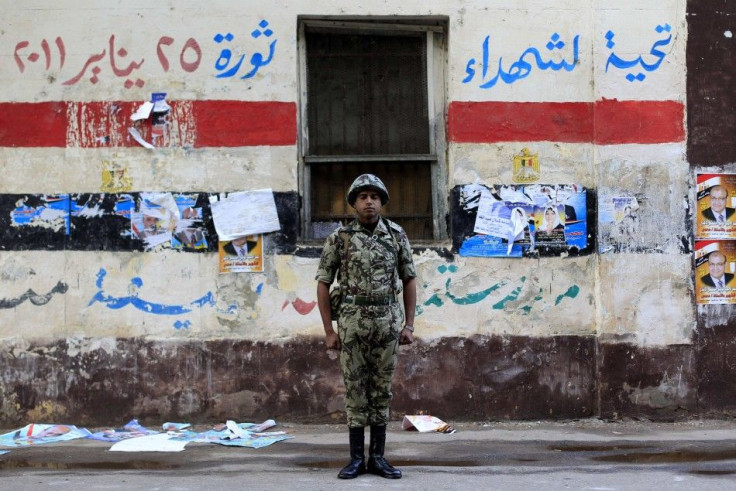Muslim Brotherhood Claims Lead In Egyptian Vote

Soon after the polls closed in Egypt Thursday night, the Muslim Brotherhood asserted on its television channel that its candidate Mohamed Mursi was ahead based on the tally from some districts.
The influential Islamist group, with its well-organized support base, had been expected to do well. Other candidates claimed to be ahead in a handful of areas, but the overall picture will not be clear for some time, Reuters reported. There were no reliable exit polls.
The Egypt Independent site of the Al Masry Al Youm (Egypt Today) newpaper reported Friday morning that five of the 13 candidates had a chance of advancing into the runoff: Mursi; Ahmed Shafiq, who was Hosni Mubarak's last prime minister; leftist leader Hamdeen Sabahi; former Brotherhood leader Abdel Moneim Abouel Fotouh and the former foriegn minister and head of the Arab League, Amr Moussa.
At 4 a.m. Friday Cairo time, Al-Ahram, the flagship state-run newspaper, reported that based on official tallies of 1,210 polling stations -- fewer than 10 percent -- Mursi has won 414,049, or 35.4 percent of the vote, with Shafiq in second place with 342,556 votes, or 29.3 percent. Abouel Fotouh won 24.3 percent and Sabahi 18.8 percent, according to Al-Ahram's tally.
Rassd News, an independent newswire, announced the results of 3,046 out of the country's 13000 polling stations. It said Mursi is in first place, followed by Shafiq, then Abouel Fotouh, then Sabbahi and finally Moussa. Morsi won 1.38 million votes in these polling stations, well ahead of Shafiq's 867,469.
After high turnout on the first day, Egyptian media said it only reached 40 percent on Thursday, with ballot counting beginning immediately after the polls closed. The government had declared Thursday a holiday to make it easier for public sector employees to cast their ballots.
Election commission head Farouk Sultan told Al Ahram that total voter turnout for the elections stood at roughly 50 percent.
According to reporters on the ground, turnout appeared high in urban areas of the country. Judges in Cairo, however, voiced their disappointment with turnout figures. Judge Hisham Raaouf, for his part, head of the Cairo Appeal court, said he had not expected such a low turnout.
We had anticipated higher turnout figures than those seen in last year's parliamentary elections, but this didn't happen, he said. This suggests that many Egyptians are dissatisfied with either the electoral process or the presidential candidates themselves.
In rural areas, voter numbers appeared even lower. Two villages in Upper Egypt boycotted elections to protest months-long shortages of bread and butane gas.
There were almost no reports of electoral violence on the second day of polling. Nor were there many reports of electoral violations.
After six decades under military-backed rule, Egypt's 50 million eligible voters were choosing whether to entrust the nation to an Islamist president for the next four years, alongside the Islamist-led parliament they elected earlier.
But secular figures such as ex-Arab League chief Amr Moussa, 75, and Mubarak's last premier Shafiq, 70, appealed to Egyptians wary of radical change.
If no one wins more than half the votes needed for outright victory in Wednesday and Thursday's first round, the top two candidates will contest a June 16 and 17 run-off.
Egyptians seemed increasingly polarized between those determined to avoid handing the presidency back a man from Mubarak's era and those fearing an Islamist monopoly of ruling institutions.
Some voiced fears of a backlash on the streets, particularly if Shafiq, who like Mubarak was air force commander, triumphs. Protesters hurled stones and shoes at Shafiq when he voted in Cairo on Wednesday.
If Shafiq or Moussa wins, they will create a revolution. Everyone will go down to Tahrir again, said one voter, Sherif Abdelaziz, 30, who backs the Brotherhood's Mursi, referring to the square in central Cairo where mass protests have been held.
Shafiq and Mursi supporters clashed in a village north of Cairo on Thursday, wounding five people, police sources said.
A page on Facebook, a medium used to devastating effect against Mubarak, was launched on Thursday threatening a revolution if Moussa or Shafiq wins.
The mother of Khaled Said, the activist whose death in 2010 at the hands of police helped galvanize anti-Mubarak protests, also derided feloul, or remnants of the old order.
If any of the feloul win, it would be because the vote was rigged. Egyptians will never retreat from their revolution, Said's mother Leila told Reuters by telephone.
Mursi, 60, was pitched into the race after the Brotherhood's first choice was disqualified. His main Islamist rival is ex-Brotherhood member Abouel Fotouh, 60. Leftist Sabahi, 57, is a dark horse in the race.
As evening fell, Moussa made an 11th-hour appeal for Egyptians to head to the polls.
Grab the chance of the last few hours to go down. It is vital that they vote ... Go down, take part in building the new Egypt, he said, walking near his campaign office.
Sabahi is a leftist who had been a dark horse but gained steadily in opinion polls over the past week, attracting Egyptians who want neither an Islamist or a former regime figure.
Aboul Fotouh's moderate, inclusive platform has won him the support of some liberals, leftists and minority Christians. As a dissident former Brotherhood leader, he has also won the backing of Egypt's ultraconservative Salafis, whose candidates won a quarter of the votes in recent parliamentary elections.
Mursi entered the race late but has benefited from the Brotherhood's powerful political machine. His victory would likely mean a greater emphasis on religion in government.
© Copyright IBTimes 2025. All rights reserved.





















